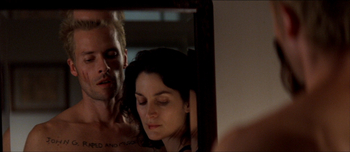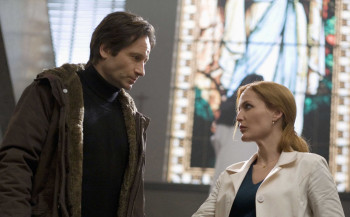100 Favorite Movies, 2000-2009
The Top 10:  1. Memento
1. Memento
2. Pan’s Labyrinth
3. Requiem for a Dream
4. Oldboy
5. The Royal Tenenbaums
6. No Country for Old Men
7. The Mothman Prophecies
8. Mulholland Drive
9. Donnie Darko (original theatrical version)
10. The Descent (international version)


 This commentary track deals with a handful of themes: the blunt use of color contrasted with the almost tangential way the movie deals with its ostensible theme of liberty; the use of visual and aural cues to indicate the subjective nature of the film; Julie’s progression from isolation to active engagement with the world; and the relationship between the concept of “freedom” and Kieslowski’s obvious interest in responsibility. Plus, I call Juliette Binoche a “two-faced bitch.” How can you resist?
This commentary track deals with a handful of themes: the blunt use of color contrasted with the almost tangential way the movie deals with its ostensible theme of liberty; the use of visual and aural cues to indicate the subjective nature of the film; Julie’s progression from isolation to active engagement with the world; and the relationship between the concept of “freedom” and Kieslowski’s obvious interest in responsibility. Plus, I call Juliette Binoche a “two-faced bitch.” How can you resist? Iron Man started the summer on May 2, and The Dark Knight signified the end with its release on July 18. Based on what we’ve seen in recent weeks – and the uninspiring upcoming release calendar in terms of potential blockbusters – that’s how Hollywood is marking the season these days. The major new releases the past two weekends have ranged from the expired (The X-Files: I Want to Believe) to the tired (The Mummy: Tomb of the Dragon Emperor), with the requisite Will Ferrell comedy in Step Brothers.
Iron Man started the summer on May 2, and The Dark Knight signified the end with its release on July 18. Based on what we’ve seen in recent weeks – and the uninspiring upcoming release calendar in terms of potential blockbusters – that’s how Hollywood is marking the season these days. The major new releases the past two weekends have ranged from the expired (The X-Files: I Want to Believe) to the tired (The Mummy: Tomb of the Dragon Emperor), with the requisite Will Ferrell comedy in Step Brothers.